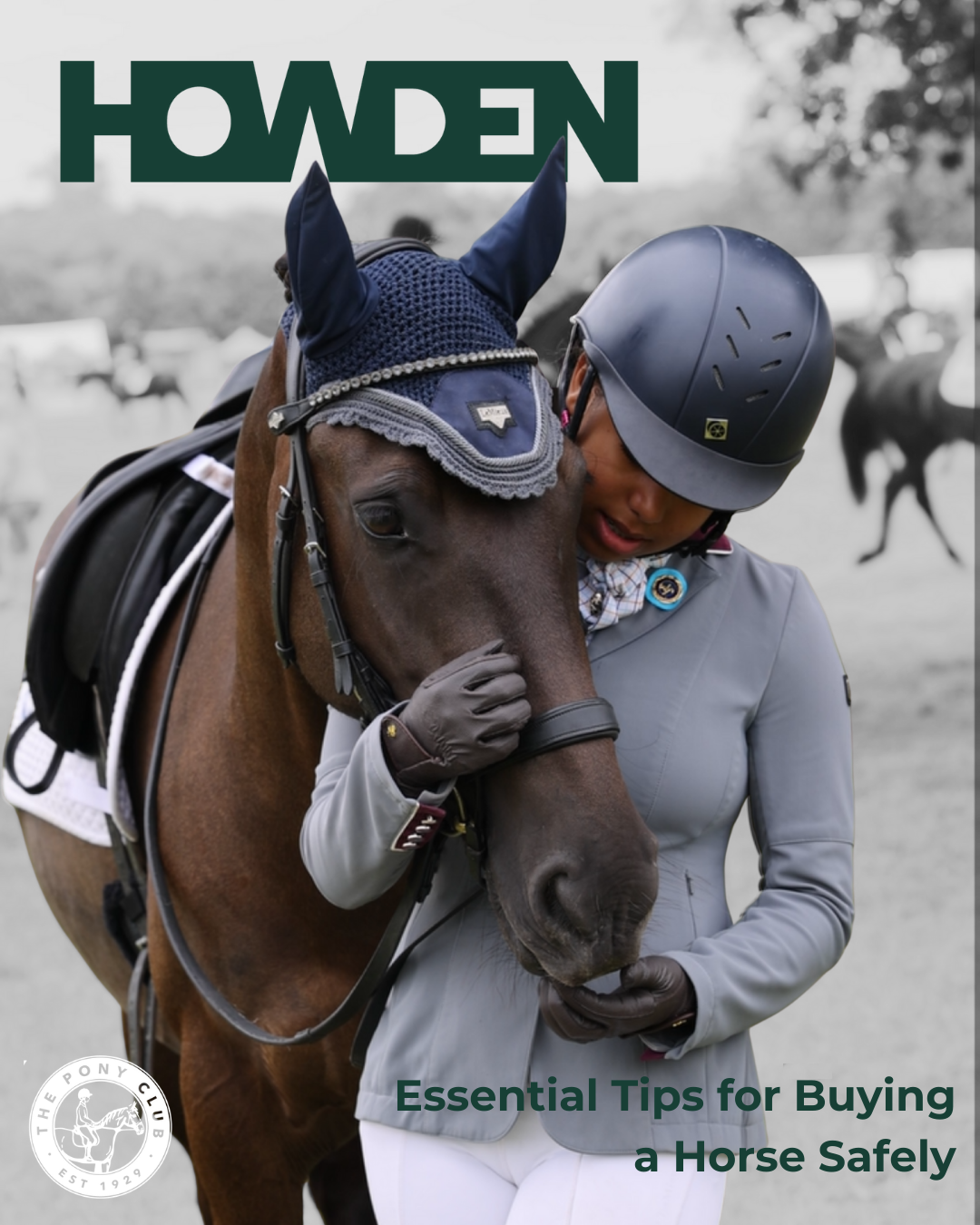News | 30 April 2025
Howden’s Essential Tips for Buying a Horse Safely
Buying a horse can be an exciting journey, especially for first timers, but there is a lot of due diligence to undertake to get the process right.
For many, owning their own horse is a dream. So, seeing it come true is a momentous moment. However, despite the emotions involved, it is crucial to keep a clear head and prioritise safety throughout the process.
This article aims to provide Pony Club members with practical advice on how to keep safe when buying a horse, from consulting with a vendor’s vet before buying, to viewing horses in different environments and seeking opinions from riding instructors.
We’ll also discuss the importance of insurance in addition to risk management.

Here’s our ultimate guide to safe horse buying:
1. Assess whether you ready to own a horse
Yearning to own a horse doesn’t necessarily mean someone is ready to do so. It can, for instance, be expensive. As well as upfront costs to buy a horse there are ongoing costs – such as feed, veterinary care and equipment. Medical issues can add to the toll. Horses can live a long time, often 25 years or longer. In fact, the BBC recently reported that the UK’s oldest horse – a mare called Roana in County Down – had just celebrated her 46th birthday. Understanding that owning a horse is a long-term commitment is therefore important.
2. Consider why you want a horse
For many riders, the desire to ride is normally behind their decision to buy. But it could also be for competition or even companionship. Different breeds suit different needs, so it’s important to know and research which is best suited to your goals – and to set a budget. By learning about different breeds, temperaments and suitability for your level of experience, finding the right horse can be made easier.
3.Find reputable sellers
Seek advice from experienced riders, friends and experts, including your Pony Club, around how to find reliable and reputable sellers. Horse shows and auctions are an effective way to meet potential sellers in real life. Never buy a horse without seeing it for yourself.
4. Always ask for a test ride and assess the horse’s temperament
Understanding a horse’s temperament is crucial – especially for beginners. If you’re new to riding then you’ll need a horse with a calm and steady temperament, so take the time to see how your potential buy behaves during handling, grooming, tacking up and riding. Keep an eye out for any signs of aggression and note how the horse responds to your cues and command.
5. Consult with a vet
It’s vital to get a comprehensive understanding of a horse’s health history before buying, and vets are the ones to turn to. You’ll need to ask about past injuries, medical treatments and overall health. If possible, pay for a pre-purchase veterinary examination to ensure there are no hidden health issues. It’s money well spent. Check for visible signs of lameness, for instance an uneven gain or stiffness.
6. Ask to see the horse in different environments
Seeing a horse in various settings, such as in the stable, being ridden, and in the field, can tell you a lot about its temperament and behaviour. It’s also wise to observe how it interacts with people and other horses.
7. Seek opinions from riding instructors
Instructors have a lot of experience in judging a horse’s suitability for a rider’s skill level and their future goals – as well as understanding a horse’s temperament and behaviour. So, ask their opinion – and if it’s possible to take them along for a test ride, even better.
8. Ensure you review all sales documents carefully
You should be asked to sign a sales contract which outlines the terms of purchase, including warranties, refunds and any conditions, when you buy a horse. You’ll need registration papers, health records and an ownership transfer document. Check everything carefully.
9. Remember to have the right insurance in place
There are potential costs and risks around owning a horse, and so having robust insurance in place is crucial. Insurance can protect against unforeseen events and financial losses.
Policies to consider include:
- Horse insurance
- Mortality and theft insurance
- Veterinary insurance (with varying levels of cover)
- Medical insurance (there may be additional costs for life-saving surgery)
- Public liability insurance
- Personal accident insurance (for anyone riding the horse)
Talk to your insurance broker about what kind of cover is best for you and your horse.
The best place to start is by looking at Howden’s advice pages: Equine insurance | Howden UK
Conclusion
Buying and owning a horse can be an exciting and highly rewarding experience – for most it’s a dream achieved.
However, it’s not a process to embark on without robust research and a focused plan.
Owning a horse is a big commitment and there can be significant financial implications if you make the wrong choice or fail to make the necessary checks about a horse’s health and temperament.
By following our tips, you can find the right horse for you and, with the right insurance in place, have peace of mind that future risks are covered.
The best advice is to take your time when buying a horse and make informed decisions to ensure a safe and successful purchase.
